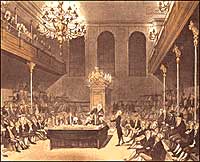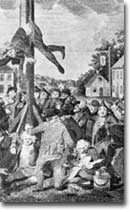
The Declaration of Independence
Lesson Plan
The Townshend Acts
- What were the key provisions of the Townshend Acts and what was the rationale of Charles Townshend and the British Parliament in passing the kind of legislation that they did?
- What was the colonists’ reaction to the Act?
- Why was Parliament surprised by the colonists’ reaction to the Act and what was the British response to the colonists?

After the Stamp Act was repealed, the relationship between England and the American colonies was still shaky. "Nervous tension" is the term that best describes it. Many issues remained unresolved. It was hard for England to enforce regulations from across the sea. Still, the British Parliament did not want the colonists to think that they were giving up authority over the colonies. So, immediately after repealing the Stamp Act, Parliament issued the Declaratory Act.
The Declaratory Act stated that Parliament had complete control over the governing of the colonies in “all cases whatsoever.” The British were not willing to give up any control to the colonies. In the colonies, leaders had been glad when the Stamp Act was repealed, but the Declaratory Act was a new threat to their independence. It was 1766, and to most colonists, the ability of England to tax the colonies without giving them representation in Parliament was seen as disgraceful. The rebellion against the Stamp Act was proof of this view. But the right for Parliament to make laws in other areas was acceptable. The intent of the Declaratory Act was not clear, though. "All cases whatsoever" could surely mean the power to tax. Colonial leaders waited anxiously for the issue to resurface.

As Britain continued to impose taxes on the colonists, reactions turned violent toward tories (colonists loyal to Britain) and British officials.
Sure enough, the "truce" did not last long. Back in London, Charles Townshend persuaded the House of Commons to tax the Americans once again. This time, though, there would be an import tax on such items as glass, paper, lead, and tea.
The Ties that Bind
Charles Townshend had two reasons for introducing new taxes into Parliament. He wanted to collect money from the colonies, but he also wanted more power for Britain. His idea was to use the taxes to pay the colonial governors. This was a big change. Before, the colonies paid their own governors. That way, if people were not satisfied with the governor’s leadership, they could cut his salary. The legislature could basically blackmail the governor into doing what they wanted. Once the salary process changed, the governors could be free to oppose the colonial assemblies. Instead, they would be more tied to Parliament.

Charles Townshend, Chancellor of the Exchequer, sponsored the Townshend Acts. He believed that the Townshend Acts would assert British authority over the colonies as well as increase revenue.
Townshend also created an American Board of Customs Commissioners. Officials from this group would be stationed in the colonies to enforce tax policy on imports and other goods. Customs officials received bonuses for every smuggler that got convicted, so they had reasons to want to catch and capture colonists.
Finally, Townshend began putting pressure on the colonies to obey and support Britain. He even suspended the New York legislature because they did not have enough supplies for the British troops stationed there. As the pressure increased, it seemed like a conflict was bound to happen.
You are Charles Townshend. Write a short letter to the New York legislature telling them why you have decided to shut them down.
Just as they did during the Stamp Act, colonists reacted to the use of force from Britain. Not being allowed to import goods meant that smuggling increased. Tax collectors and merchants who violated the boycotts were often harassed. The colonial assemblies sprang into action to try to improve conditions for their people.
You are a smuggler talking to your 12-year-old son about your business. Do you encourage him to follow in your footsteps? Why?
Take It Back
In a letter to the other colonies, the Massachusetts legislature recommended that the 13 colonies take action against Parliament. As a response, Parliament voted to dissolve the Massachusetts legislature. But colonial assemblies reacted strongly and voiced support of Massachusetts by supporting the letter. Feelings of disgust for Britain were growing.
More Information on the Massachusetts Circular Letter
Samuel Adams wrote the Massachusetts Circular Letter in 1768. The letter was a petition inviting all of the colonies to unite against Britain. In it, Massachusetts said that it was wrong for England to tax the colonies without giving them representatives in Parliament — “taxation without representation.” When news of the letter came to England, Lord Hillsborough warned colonial legislatures against promoting any such ideas. He threatened to remove powers from any colony that joined Massachusetts' campaign. Even so, many legislative assemblies throughout the colonies, including New York, Rhode Island, and New Jersey, spoke out against “taxation without representation” and accepted the petition written by Samuel Adams.
The more rules the British tried to enforce, the more the colonists rebelled and resisted. By 1769, British merchants began to feel the sting of nonimportation. They couldn’t possibly make a living. In April 1770, news of a partial repeal reached America. But at least one import tax was still being collected and enforced: the tax on tea.
- What were the key provisions of the Townshend Acts and what was the rationale of Charles Townshend and the British Parliament in passing the kind of legislation that they did?
- What was the colonists’ reaction to the Act?
- Why was Parliament surprised by the colonists’ reaction to the Act and what was the British response to the colonists?
Start page | The Document | A Reading Signers | Related Information | Jefferson's Account | Declaration House Declaration Timeline | Rev. War Timeline | More Resources | Lesson Plan |




